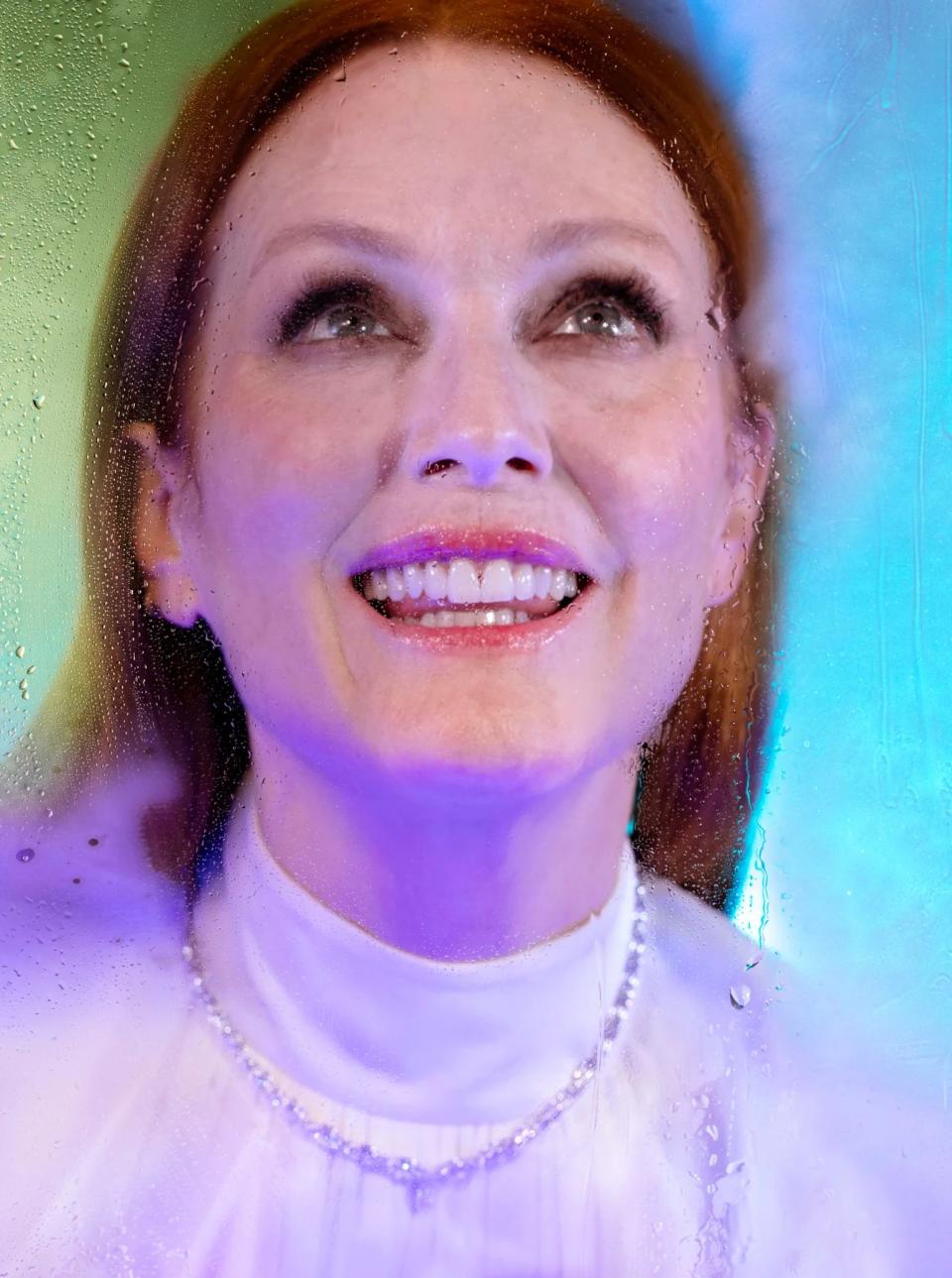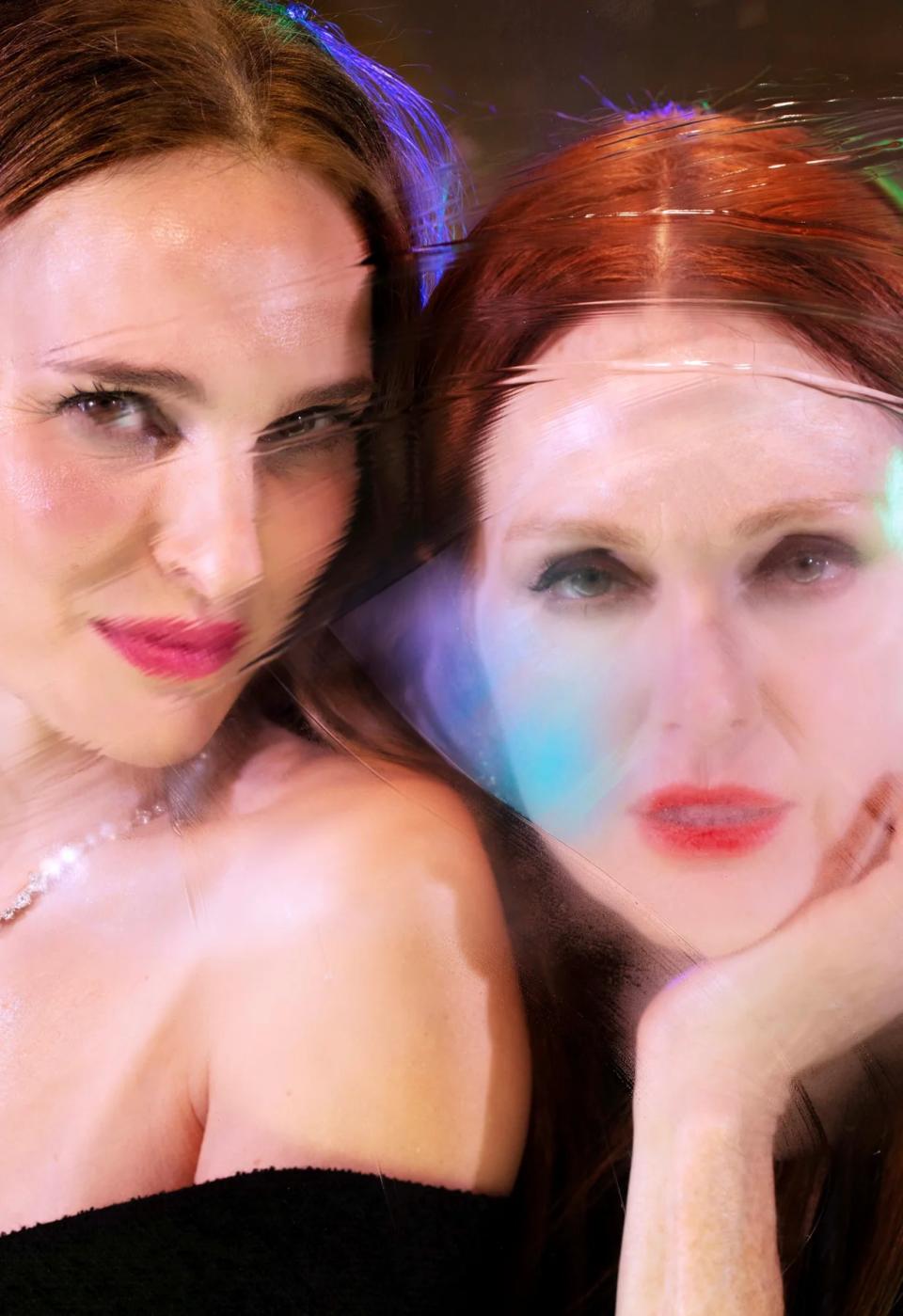Deception Perception



In May December, Julianne Moore and Natalie Portman embody psychologically complex and manipulative characters entwined in a cerebral game of cat-and-mouse. To pull it off, they found in each other simple honesty and trust
By Missy Schwartz
Photography by Marilyn Minter
There was no time for rehearsal. The 23-day shooting schedule barely allowed for the actors to get to know one another, much less exchange copious notes about their process. But when Julianne Moore and Natalie Portman arrived on the Savannah, Georgia, set of May December in 2022, they slid easily into their characters. They are, of course, consummate pros with nearly 60 years combined experience and a Best Actress Academy Award each. And they had director Todd Haynes’ assured distillation of how he saw this movie (written by Samy Burch) taking shape.
As reference points for May December—Haynes’ fifth film with Moore and first with Portman—he shared a list of more than 20 movies that included Ingmar Bergman (Winter Light, Persona, Autumn Sonata), Billy Wilder (Sunset Boulevard), Mike Nichols (The Graduate), John Schlesinger (Sunday Bloody Sunday) and Robert Altman (Three Women). “We were watching all the same things, so that really put us in the same place,” said Portman, who is also one of May December’s producers. “Todd is such an extraordinary conductor. He communicated his inspiration and his vision so well.”
Portman stars as Elizabeth, a TV actress who has been cast in a movie to play Gracie (Moore), a Mary Kay Letourneau-inspired figure whose sexual relationship with a seventh-grader when she was 36 landed her in prison. To study this perplexing ex-con with an iron will and a closet full of frilly dresses, Elizabeth insinuates herself into the ostensible domestic bliss that Gracie has built with the now-adult Joe (Charles Melton) and their three teenage children. Her presence has a destabilizing effect: The two women lock into a subtle power play that forces all three main characters to look at who they really are—sometimes quite literally: A series of visually daring scenes plays with mirrors and doubling. Whether the characters accept what they see in those reflections is another matter. At its core, May December is a deft exploration of human beings’ willingness to lie to themselves.
On a late November afternoon in downtown Manhattan, Portman and Moore sat side by side in the airy studio of artist Marilyn Minter, who had just photographed them for TheWrapBook. Relaxed and upbeat (despite, in Moore’s case, a cold), they talked about their first, but probably not last, cinematic collaboration.

May December is the first time you’ve worked together, but you knew each other’s work, and Julianne, you and Todd have a long history. How was it, putting all these pieces together?
Portman: Well, I’ve admired Julie forever. I worship her work, and I’ve always dreamed of working with her. It was so exciting and scary to encounter someone you admire so much because there’s always a chance they can’t live up to the pedestal. But she was so extraordinary as an actress and so brilliant to watch. Luckily I got to in-character study what she was doing. And she is also so generous and kind. I felt like an interloper in this club that she and Todd have. When we all got together, I was like, Oh my God, am I going to be the odd one out? And they both immediately put their arms around me and Charles and all the rest of our cast.
“It was very intimate. It’s a moment of real closeness and seduction, which is also a power move, right?”
Julianne Moore
Moore: But that’s what Natalie’s vibe was too. You don’t know what someone’s process is going to be like or what their affect or attitude is going to be on set, but she was really easy and open and present and supportive. She was so much a colleague. For a relationship in a film where the characters are so combative and vying for dominance, it was a very easy, completely nondominant relationship. I hate antagonism. It shuts me down. I’d rather leave.
Portman: Save the drama for the screen.
Moore: Yeah, exactly.
The movie explores the idea of how we all perform to some degree every day. Natalie, you play an actress who isn’t quite at your skill level.
Portman: (Laughs) Thank you!
She is a performer by trade, but she’s also acting throughout the film, showing different sides of herself depending on who she’s talking to. How did you approach those different types of performing?
Portman: It was, first of all, so beautifully written by Samy Burch. Talking to Todd, one of the things that was most helpful was to make Elizabeth really down-to-earth when you meet her so that you trust her. It was tempting to come in in a stereotypically actressy way to a small town, but Todd pushed against that. And that was a key to it because even that’s performance, to be, like, “I’m just like one of you! I can hang at a barbecue!” (Laughs) So she’s almost a detective in this story to observe Gracie and Joe…and you go with her. And then that unravels.
Right. We think she’s our proxy, but that shifts. Julianne, your character is not an actress, but she certainly performs.
Moore: Talk about somebody who’s performing gender. I would say she swallowed gender culture whole—that kind of performative femininity. Her narrative is a rescue narrative. Her prince came along, but he was 13 years old, so that means she’s got to elevate that prince to being a man and remain the princess. So she’s a little girl with an apron on pretending to be a mom. She does feel that she is naive, she does believe in fairy tales. She does believe in romance. The projection of that narrative and the reality of (her) transgression, they’re so far apart. That’s where that emotional volatility comes from that Samy wrote so beautifully. In her private moments, she’s hysterical because it’s just too much. She’s built this whole story, and wait a minute. It’s not gonna hold anymore.
Where did the idea for Gracie’s lisp come from? Todd has commented on Mary Kay Letourneau having not a lisp but a “lazy tongue.”
Moore: Yeah, there was (archival) stuff that I looked at, but I was also thinking clinically about what I could do physically that Natalie would be able to imitate. We still have associations with baby-talk or lisping as being very childlike. So I called Todd and…we were both very unsure, frankly. But I liked it because it was an outward manifestation of her story. When someone says to you over and over again, “See me this way,” I think it’s interesting.
Speaking of Elizabeth’s imitation of Gracie and the theme of duality, several stunning scenes use mirrors. There is one in the clothing store, where you sit next to each other, chatting and sizing each other up as you look at your reflections. And Gracie is reflected twice. Was shooting that as complicated as it looked?

“I felt like an interloper in this club that she and Todd have. When we all got together, I was like, Oh my God, am I going to be the odd one out?”
Natalie Portman
Portman: Just to piggyback off of what Julie was saying, that was a real gift to have these very identifiable traits that I could mimic because it was very scary going into that without rehearsals. It’s the acting I admire most that Julie does because it’s so fearless and, like, extreme choices. (Both laugh) Todd and I were living for the mirror scene in the dressing room when she says, (lisping) “Precisely.” It’s so amazing. And it’s so human—it’s real and felt. And then the mirror stuff was technically very complicated. You were looking at marks in the lens, so you have to absorb the artifice of what you’re doing, and then look at marks for yourself, each other, and Gracie’s daughter (Elizabeth Yu). But the beautiful thing was that it was so much about performance and identity and reflection and how it affects our identity. That reflection is performance and these two women mirror each other in ways that attract and repel.
Moore: It was technically really challenging because it all had to be one take.
And then there is the scene in front of a bathroom mirror, where Gracie does Elizabeth’s makeup. Natalie, your character is much more vulnerable here, especially when Julianne smooths your hair.
Portman: That scene was most surprising to me in the writing, that it revealed itself in ways when we said it that I never got reading it or preparing for it. I understood things in the silence when it was happening.
Moore: It was very intimate. It’s a moment of real closeness and seduction, which is also a power move, right?
Portman: It was so wild, too, because a great director, whose name I won’t say, once said to me, “All American drama is about the father-son relationship.”
Moore: Oh my god. (Groans)
Portman: And I asked, “What about the mother-daughter?” And that was one of the things that revealed itself in that scene. It was all about these women’s experiences with their mothers. Even for an actress, who’s used to having someone put makeup on her, there is a memory of a mother (in that intimacy). Both of them are sharing their mother’s stories.
Moore: Like, who are you? Who did your mother tell you to be? You say your mother was a scientist and I say my mother was beautiful.
Portman: It was really affecting; it was so deceptive on the page. “What was your mother like?” “Beautiful.” It was the most tragic line. You could tell where these callous, manipulative women’s origins were and where their hearts were broken.
The tone of May December is masterful. Amid the tension and drama, there are moments of dark comedy, like your “hot dog” line, Julianne. (During the barbecue, the camera zooms in on Gracie and Marcelo Zarvos’ unnerving piano score kicks in just as she opens the fridge and says, “I don’t think we have enough hot dogs.”) It lands so perfectly. How hard was it walking that tonal razor’s edge while you were shooting?

Moore: Tone is one of the most important things. Whenever I start a job, I’m like, Oh, please, let’s all be in the same movie. It takes a great director to establish that and the kind of people that Todd draws around him, the sensibilities, I think everybody understood the inherent drama and that these are funny lines. “Hot dog” is just funny. I mean, if you say “hot dog,” it’s gonna get a laugh. And it’s the zoom and the music. It’s that deliberate sense of doom. Right away, the audience goes, Oh, wait. What? This feels off. Why do I feel uncomfortable? Why does it feel dangerous? I always love that feeling in movies. What is truly dangerous? Is a monster dangerous? Not really. But when it’s behavior that’s dangerous, I think that puts us on edge because I don’t trust that person. I don’t know if they’re telling the truth. They’ve crossed a boundary and I know it’s going to happen again. I think with all of them, they feel like truly dangerous people! (Laughs)
Throughout the movie, Elizabeth absorbs Gracie’s mannerisms. Near the end, Natalie, you deliver a monologue to the camera as Gracie, reciting one of her old love letters to Joe. Not to ask a head
exploder, but you’re an actress playing an actress who is imitating a woman, played in real life by another actress. That’s a lot of layers to navigate.
Moore: Tone is one of the most important things. Whenever I start a job, I’m like, Oh, please, let’s all be in the same movie. It takes a great director to establish that and the kind of people that Todd draws around him, the sensibilities, I think everybody understood the inherent drama and that these are funny lines. “Hot dog” is just funny. I mean, if you say “hot dog,” it’s gonna get a laugh. And it’s the zoom and the music. It’s that deliberate sense of doom. Right away, the audience goes, Oh, wait. What? This feels off. Why do I feel uncomfortable? Why does it feel dangerous? I always love that feeling in movies. What is truly dangerous? Is a monster dangerous? Not really. But when it’s behavior that’s dangerous, I think that puts us on edge because I don’t trust that person. I don’t know if they’re telling the truth. They’ve crossed a boundary and I know it’s going to happen again. I think with all of them, they feel like truly dangerous people! (Laughs)
Throughout the movie, Elizabeth absorbs Gracie’s mannerisms. Near the end, Natalie, you deliver a monologue to the camera as Gracie, reciting one of her old love letters to Joe. Not to ask a head exploder, but you’re an actress playing an actress who is imitating a woman, played in real life by another actress. That’s a lot of layers to navigate.
Portman: (Laughs) All of us are performing in so many ways. Women, like Julie was saying, have a particular feminized way of performance: how we present ourselves, how we want other people to see us physically, how we want other people to see us behaviorally, the emotions we are allowed to show or not. And of course, actresses are the (perfect) example of that because we’re performing on top of all the feminine performance. And in that scene, that’s something that we talked about, Todd and I. For someone who’s always performing, what if their most true is when they’re literally performing? What if the most honest they ever are and the most free they are is from the artifice? The mask can free you the same way that at a mask party, people would go wild. There’s freedom in the mask.
The post Deception Perception appeared first on TheWrap.

 Yahoo Sports
Yahoo Sports 